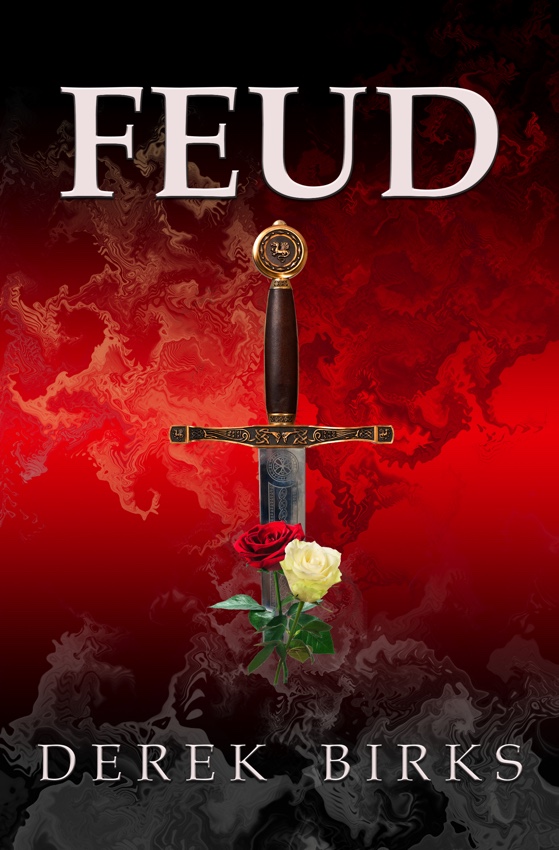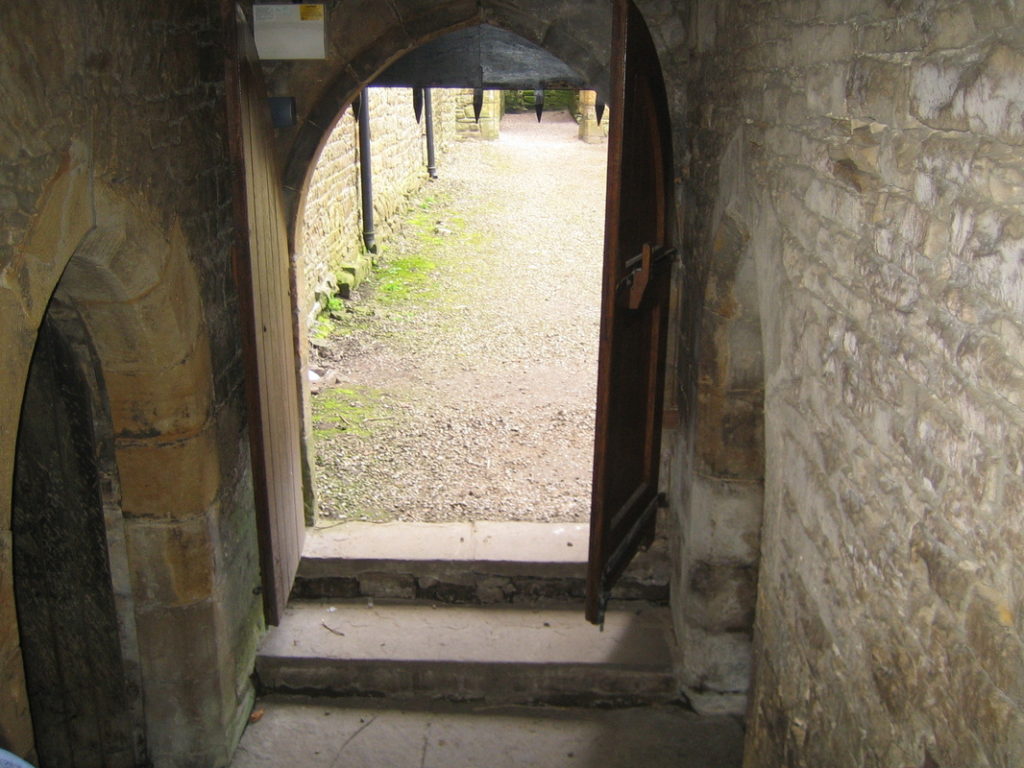 Today I’m delighted to welcome historical fiction writer Derek Birks and his fearsome character Ned Elder. Derek was born in Hampshire, England but spent his teenage years in New Zealand, where he still has strong family ties. After many years teaching history he took early retirement to concentrate on writing. He also spends his time gardening, travelling, walking and taking part in archaeological digs at a Roman villa.
Today I’m delighted to welcome historical fiction writer Derek Birks and his fearsome character Ned Elder. Derek was born in Hampshire, England but spent his teenage years in New Zealand, where he still has strong family ties. After many years teaching history he took early retirement to concentrate on writing. He also spends his time gardening, travelling, walking and taking part in archaeological digs at a Roman villa.
Derek’s favourite period is the late medieval and he writes action-packed fiction rooted in accurate history. His debut historical novel, Feud, is set during the Wars of the Roses and is the first in the Rebels & Brothers series following the fortunes of the fictional Elder family. The fourth and final book of the series, The Last Shroud, was published in 2015. But fans will be relieved to hear that the Elders will return in Scars from the Past, the first of a new series, in December 2016.
Welcome, Derek. Why did you write this book?
I started writing Feud – my debut novel – about ten years ago. I had always wanted to write stories of adventure and action but had never found the time to do it. Work commitments meant that I found it impossible to give my writing the dedicated time it required. So I went part-time but, even then, I still could not find enough hours in the day to write. Finally, I took early retirement and committed full time to writing. The idea of writing Feud was not just a decision to write, but a decision to change what I did with my life.
Why the Wars of the Roses? In my former life I was a history teacher and my favourite period of history was a stick of rock with the word Plantagenet running through it. The events – well you couldn’t make them up. What I wanted to do was write a story with a raw edge to it: fast, brutal and real. I wanted young fictional characters to interact with the actual historical figures. There had to be both male and female protagonists and I wanted the reader to be constantly surprised about what would happen to the characters next – right up to the last page. The result is Feud and I hope it fulfils what I set out to achieve.
Who is your main character?
One of the heroes in Feud is Ned Elder, a young Yorkshire knight on the eve of the outbreak of the Wars of the Roses. Ned did not change very much in all the time I was writing Feud. He’s young: around 18 when the story begins in September 1459. He is a second son and thus inexperienced, untrained in estate management, strategy or leading men in battle.
He is a skilled swordsman, though he relies on strength rather than finesse. In battle, he is headstrong and frequently careless of his own safety – and probably that of others.
Ned has his own code of honour and when his family is brutally attacked he is stunned. He can make no sense of it. He is clutching at plans of action. His sisters have been abducted, so he should try to rescue them. His lands have been taken, so he should try to win them back, etc, etc. But how he might actually achieve any of these things, he has no idea.
Feud is about how Ned tries – in his own somewhat bludgeoning style – to recover what has been lost. Ned and his two sisters – the other main protagonists – are all young and they make mistakes as young people do. Does Ned learn from his mistakes? Yes, he does, but not before the end of Feud.
Why do you think Ned Elder is like he is?
My hero, in a time of war, needs to have martial skills. That is an essential ingredient: he is a warrior with a warrior’s spirit. I want him to protect the weak and to be true to himself.
BUT… such characters are often painted as flawless: always right, endlessly decisive and always arriving in the nick of time to save the day. I wanted Ned to seem real, which means to be flawed: sometimes arriving too late to save the day, sometimes making the wrong call with fatal consequences for those he loves and sometimes utterly overwhelmed by what he faces.
Some readers find this annoying; they also find it annoying that the mistakes this young, untried leader makes cause people to be killed. But that’s what can happen in life. Over the four books of this series, Ned changes. As he gets older he learns – as hopefully we all do – from experience.
What does Ned think he is like?
Ned sees himself through a fifteenth century lens as a Christian knight, a man of honour. He also sees his future path as a follower not a leader because he expects that his older brother, Thomas, will inherit the family estates.
A second son is a “spare” so he is unlikely to enter the church. More usually, he is trained as a soldier and destined to play a supporting role to his elder brother. Ned idolises Thomas and is comfortable in the supporting role. He seeks no more than that. He envisages life as a soldier, perhaps fighting overseas at some point as his own father had fought in the French wars in the 1440s.
When “all hell breaks loose” Ned feels cast adrift because all the certainties of his world have been removed: father, brother, sisters, lands, home… To him, it’s as if all that has happened up to that moment is irrelevant, meaningless. He must play a different role from that which he always expected.
Which of us would not struggle to adapt to such a situation at the age of 18?
He can rely on only a few followers but they expect him to lead them and he does not know how to lead. Ned falls back on what he knows best: how to wield a sword. He therefore leads in a very blunt and warlike manner. Throughout the story, Neds finds it difficult to believe what is happening to him and his supporters. He becomes more brutal and ruthless, propelled by rage and thoughts of revenge.
His relationship with Amelie, a French girl he meets along the way, is clouded by the violence that strikes at them all. He cannot, as she sometimes does, seek solace in the church. He is close to despair and the only way forward he can see is to fight. His desperation leads him to accept that he may very well not survive the struggle.
You may think that Ned Elder sounds rather rash but you wouldn’t if you met his sister, Eleanor… but that’s another story…
(One which we must hear about sometime!)
thank you Derek (and Ned) for being my guests today.
So what’s Feud about?
 1459. England stands on the brink of chaos and as the Wars of the Roses begin, the rule of law breaks down…
1459. England stands on the brink of chaos and as the Wars of the Roses begin, the rule of law breaks down…
Whilst York and Lancaster go to war for the throne, in the heart of Yorkshire the Radcliffe family have an old score to settle with their neighbours, the Elders.
When the feud breaks out, Ned Elder is a young, untried knight. With his father executed, his older brother butchered and his two sisters roughly abducted, it seems that Ned is the family’s last hope of survival. Yet he barely escapes with his life and is pursued across the land with only a few loyal companions. To defeat the Lancastrian Radcliffes, Ned must join the civil war on the side of York, but victory seems a long way off.
Imprisoned in a remote nunnery, his wild and rebellious sister, Eleanor, has not given up but can she find the strength to fight back? The fate of the Elders will hang as much upon the courage of Ned’s sisters as his own skill with a sword.
As the civil war rages across the snow-covered battlefield of Towton, the Elders fight for survival and the bitter feud is played out to its bloody conclusion.
“From the eye-catching cover to the last page, Feud is an exciting story of survival through personal upheaval during a vicious war, where the outcome is not always certain.” Historical Novel Society.
Feud is the first of a four book series entitled Rebels and Brothers. The story continues in A Traitor’s Fate.
Links to Amazon.co.uk and Amazon.com
Connect with Derek via Twitter (@feud_writer), website and blog.
Alison Morton is the author of Roma Nova thrillers, INCEPTIO,
PERFIDITAS, SUCCESSIO and AURELIA. The fifth in the series, INSURRECTIO, was published in April 2016.
Find out more about Roma Nova, its origins, stories and heroines…














Many thanks, Alison, for letting Ned Elder (and me) loose on your blog.
Well, Ned’s been quite well behaved so far…
I love Ned, flaws and all…I personally think you created a very human hero, although at times it is dificult to remember he is so very, very young…Great post!
Thanks, Anna!
Extremely interesting article by Derek and Alison and thanks to both you and Derek for the chance to read it. I think this is such a good idea to come at historical fiction of interest to readers through a detailed account of the main character. In my case to my amazement, on investigation I discovered I already have the first book in Derek’s series on my Kindle after purchasing it a long time ago. It is still unread, probably because I have far too many ebooks on my Kindle. I will probably need another lifetime to read them all. In the case of Feud I will be rectifying that straight away!
Thanks. I hope you enjoy Feud.